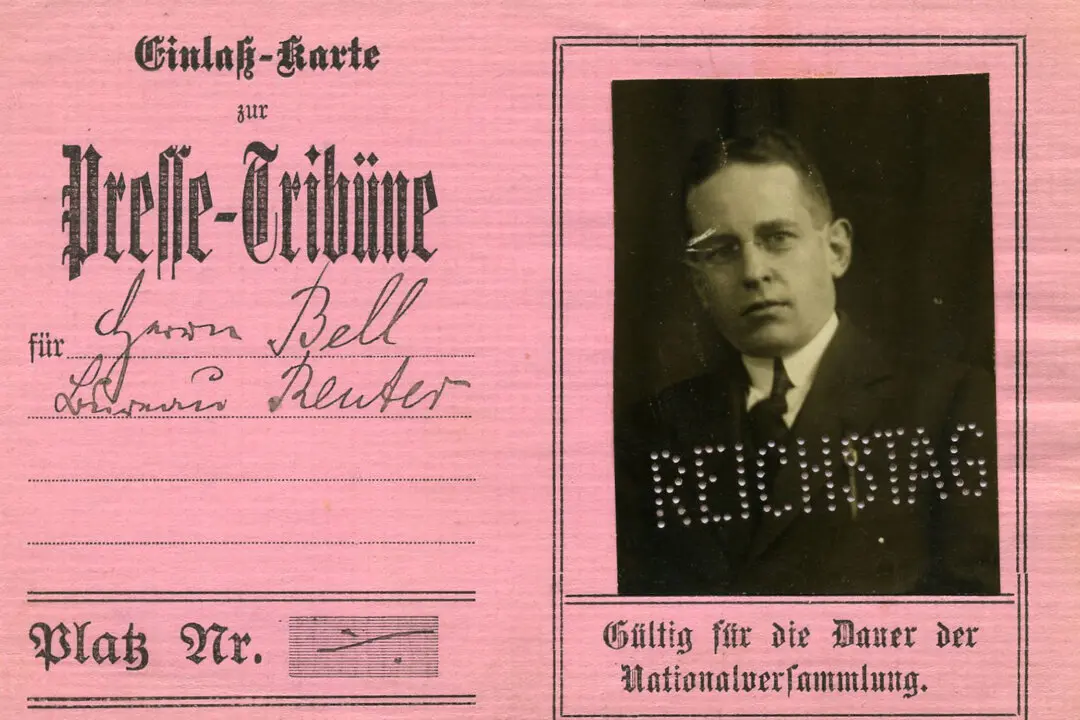Who is the greatest spy in history? Jason Bell, professor of philosophy at the University of New Brunswick, claims he may have found him.
In his new book, “Cracking the Nazi Code: The Untold Story of Agent A12 and the Solving of the Holocaust Code,” Mr. Bell suggests that a brilliant Nova Scotian philosopher by the name of Winthrop Bell (no relation to the author) is “quite possibly history’s greatest spy.” After having read the book, there most definitely is substance to the claim.
The Perfect Recruit

The intriguing story of Winthrop begins in Göttingen, Germany as a doctoral student studying under the renowned phenomenologist philosopher, Edmund Husserl. When war in Europe breaks out, Winthrop is, like thousands of other Brits, arrested and thrown in jail. He was one of many British civilians placed in the Ruhleben internment camp.
As Mr. Bell makes clear, there were worse places for Winthrop to be. He was not merely surrounded by fellow Britons, but fellow students and accomplished artists. The story of Ruhleben is intriguing in itself, as the artists performed concerts and plays; and others, like Winthrop, taught educational courses. Ruhleben prison was turned into “Ruhleben University.” According to Mr. Bell, “The university was a remarkable success. Distinguished institutions, such as Oxford, Edinburgh, and the University of London later recognized Ruhleben credits.”
Winthrop’s experience within the prison displayed his personality and leadership. He was a brilliant, friendly, and formidable individual. When the 1918 armistice was signed, it was his high level connections, familiarity with Germany, and his fluent and accented German that would make him even more useful once out of prison.

Connecting the Dots
During this period of internal postwar struggle in Berlin, Winthrop shone as an “ambassador, spy, journalist, agent handler, and intelligence analyst” for Britain’s new MI6. The young philosopher was provided a cover as a journalist for Reuters, which enabled him to meet and interview high level officials on both sides of the Berlin struggle. Winthrop interviewed future heroes who fought against the rise and reign of the Nazis, as well as present and future villains.Mr. Bell establishes that Winthrop quickly connected the dots of a future global race war. Those dots included the Jew-blaming Gen. Erich Ludendorff; the arrival of Talaat Pasha in Germany, who was the orchestrator of the Armenian genocide in Turkey; the counterintuitive collaboration between the Soviet-backed communists and the far-right Freikorps to topple a democratic government; the discovery of Germany’s 1915 “antisemitischen Bewegung,” which English newspapers translated as the Anti-Semitic League; and the slaughter of more than 100,000 Jews in Ukraine from 1918 to 1919. According to Winthrop, it all seemed to connect with a potential alignment between Germany, Russia, and Turkey.
The philosopher student-turned-spy under cover as a Reuters reporter provided detailed information of not just the dangerous political struggle and the “bizarre scheme for the next world war,” but, importantly, he also provided information on how Berlin, and Germany as a whole, was falling apart economically and socially through the Allies’ ongoing blockade. The Germans were starving, and the misery and death were resulting in factional violence and leading them toward revolution―the kind that had recently overtaken Russia.
An Insightful Spy

His reports were often turned into articles, but always provided to MI6. The more urgent and time-sensitive information was quickly telegraphed to MI6, such as his warning about the proto-Nazis’ invasion of Riga, Latvia. Mr. Bell notes that, unfortunately, not all of Winthrop’s insights were heeded, like his recommendation for economic assistance to Germany (a proto-Marshall Plan) and scaling back the harshness of the Versailles treaty (recommendations that pre-dated John Meynard Keynes), and his warnings about the rise of the Nazis and the plan for the Holocaust.
What is fortunate, however, was that Winthrop’s discoveries and reports were presented to those at the highest levels in Britain, including Prime Minister David Lloyd George, future Prime Minister Winston Churchill, and the intelligence community. This information enabled Britain to prepare militarily sooner than most nations.
As Mr. Bell notes, Winthrop, due to his placement and ability, was not just steps ahead of most everyone, but miles ahead. Winthrop was the first to break what Bell calls “the Holocaust Code,” which was a “plan so evil” that “‘even the ablest observers seem to have been unable to grasp it.’”
As aforementioned, Mr. Bell’s focus on Winthrop is singular, which makes for a relatively short book considering the life Winthrop lived. Winthrop Bell is undoubtedly deserving of a massive biographical study due to his work in phenomenology (for which he was also a professor at the University of Toronto and Harvard University), his time in the Ruhleben prison, his connections with some of the world’s most powerful people (in Britain, Canada, Germany, and America), and particularly his work as a spy.
Nonetheless, Mr. Bell’s “Cracking the Nazi Code” is a cloak and dagger tale worth reading. The author provides great historical insight, highlights overlooked or ignored moments, and helps resolve questions about the early collaborations between the leftists and rightists in Berlin and why it took so long for the world to believe Adolf Hitler and the Nazis were bent on the destruction of what they called the non-Aryan world.









